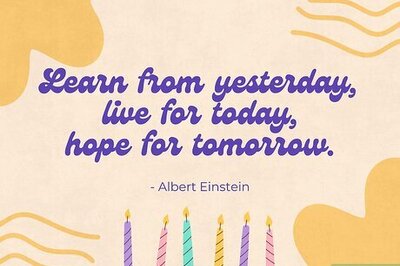
views
With films like Ishqiya and Udta Punjab to his credit, director Abhishek Chaubey established himself as one of cinema’s most promising and bold new filmmakers. His next Son Chiriya, set in 1975, is the story of a dacoit from Chambal and features Sushant Singh Rajput and Bhumi Pednekar in lead roles.
Chaubey began his film career as an assistant director in 2002 working for Vishal Bhardwaj in latter’s directorial debut Makdee. He went on to assist Bhardwaj in all his subsequent films, and most notably co-wrote two of the most successful movies of his career— Omkara and Kaminey.
In an exclusive interaction with News18 at the 12th edition of Film Bazaar in Goa, Chaubey talked about his fascination for raw and hard-hitting subjects, his association with Bhardwaj, representation of women in the Indian cinematic narrative and whether India’s #MeToo movement would bring any fundamental changes in the way Bollywood functions.
Excerpts from the interview:
If we talk about your filmography— be it Ishqiya, Dedh Ishqiya, Udta Punjab and now Son Chiriya— all your films have been very raw, provocative and hard-hitting. What is this fascination for such subjects?
I have never seen myself or my films as being very realistic but the intent has always been that you try and create a universe which is convincing as opposed to very real. If we take a look at 'Dedh Ishqiya', I think it's a completely fantastic universe which may not be steeped in realism, although there have been nawabs and mushairas but in 2014 when the film came out the world was very different from the way I approached it. 'Udta Punjab' was steeped in realism or rather I would say to give an impression of realism. So my attempt as a filmmaker is just to create a convincing universe and I think it gives the audiences a feeling of it being real and palpable as if they are not witnessing something that is happening very far away from them.
As per hard-hitting you noted, it depends on where I'm in my life at that moment and how I am feeling. 'Ishqiya' has a lot of dark humour but essentially at the core of it, it's not a very serious film. And after having made two films which as far as I'm concerned were lighter, I wanted to explore something darker and that's how Udta happened. I really wanted to make a drug film. 'Son Chiriya' happened as I wanted to make an action adventure. It's about something very serious but at the same time it's an action movie and it's my most male movie.
Has it also got to do with your decade-long association with Vishal Bhardwaj, considering the kind of films he makes?
By all means. I started off being as an AD in 'Makdee'. Then I started writing 'Blue Umberella', 'Omkara' and 'Kaminey' with him. I have been tremendously influenced. Even if I try to shake it off or run away from it, it will be false because it's a part of me, it's in my DNA now. So if people see similarities it's only natural. I do not approach it consciously. I don't want to be too self conscious as a filmmaker or too self-aware. I want to do things that excite me and keep that excitement level going for the two years at least to make a film. I also come from a small town India so does Vishal so somewhere there's a commonality between us. There are a lot of filmmakers who come from that kind of heritage and like to make films about their world they have experiences.
It’s been long since we have seen any out-and-out dacoit drama in mainstream Hindi cinema. Nobody makes dacoit dramas these days. The last was Irrfan Khan’s Paan Singh Tomar. Comment.
Yeah, nobody makes them and that's sad. It is a part of our history and a very long history. My film is set in 1975. Paan Singh and Bandit Queen were also set in the same era but Bandits have been around for ages. They are criminals but it's a huge tradition-- their society, life. There are so many layers to it. Why they were the way they were why they were bandits but they called themselves rebels so what was it that motivated them to be like that. It's a part of our history and culture and I'm really shocked that we're not telling more stories about them. In the West, it's an established genre which is still being explored.
Paan Singh and Bandit Queen were based on real life people but 'Son Chiriya' is a completely fictional film which intersects with the lives of some people who did exist. I really wanted to explore that world. I wanted to shoot in Chambal because it's beautiful. I was completely overwhelmed by the society that existed and what were their concerns. I wanted to make an action film that explores their soul.
But were there any initial reservations before you actually started working on the project, given the sensitive subject of the film?
Not at all. This project is an interesting genesis. I met Ronnie (Screwvala) a few years ago while I was still doing Udta. He told me why don't you explore something western and then I started exploring Chambal. I had tremendous amount of support from RSVP. They just gave me free hand to explore the subject that I wanted to do. At that end I was pretty secure, if there were any apprehensions they were my own apprehensions which any creative person will have. But there was no external pressure.
Why did you choose Sushant and Bhumi?
One thing that stars do is actually the cost of the film become rational if you have stars like Sushant and Bhumi out there. I'm not saying that they were the only two people who could have played this role. It's a false thing to say that. But you make that choice. Also, we have entered that era where I personally find the young generation of actors extremely competent and committed. I want to blur the line between mainstream and arthouse cinema. Let’s make cinema with dignity which can appeal to all of us.
Do you think filmmakers are able to tell stories with the same freedom they earlier used to? Would any filmmaker dare to make a Bandit Queen today?
I think you can. 'Bandit Queen' has been a point of reference for future films. I loved it when it came back then. While I was making 'Son Chiriya', 'Bandit Queen' was there at the back of my mind because this terrain has been explored in that film. I personally believe when you are working in a film industry as big as this one, it will always have its own set of challenges and no matter how successful or big you are, you’ll encounter huge challenges. Vishal has been around making films for 15-16 years still he encounters huge challenges just getting a film off ground. That situation is always going to be there. At the same time, now more than ever, a filmmaker can make any film s/he wants to make. If you have it in you then you can. If you can really explore and write a good story, you can possibly make any film because today more than ever, we are in a position to do that.
But don’t you think the growing intolerance towards cinema’s reflection of the society is an alarming phenomenon?
Precisely because of it, it becomes more interesting. Obviously, as a filmmaker, I admit the fact that we don’t have more freedom and I admit that people in power look at cinema with suspicion or something to be afraid of and that’s why they want to control it and I resent it. But at the same time if I have a larger perspective or if I have to step back and look at it what we need to understand is that we are a country that’s growing now and we need to reach a certain level of maturity where people of this country say, 'hey, it’s alright filmmaker can do what they want.' I don’t think so we’re reaching there, but definitely today we’re mature than what we were 20 years ago because we couldn’t think of certain content which we are now thinking and fighting for. It’s a process in a country as divided and conflicted as ours. As a filmmaker, the only way I can contribute is to provoke you more.
Coming back to your filmography, women have always played stronger parts in your films. But the portrayal of women in mainstream cinema in general has been very problematic. Comment.
I don’t think filmmakers are philanthropists when they say they make films for the audiences, I think it’s a very false thing to say. Filmmakers make films they like. It’s a fact and when you objectify a gender it primarily means that you yourself are like that. We have to treat every individual regardless of gender with grace and dignity. And, we are inexorably moving towards it. It might seem very conflicted right now but I’m an eternal optimist and I think because there’s so much fear and discussion in the heels of whatever has happened in the last few months, it means there’s a discussion out there in the market and people are talking about it and that is the only way we’ll reach a situation where we accept the fact. And as much as filmmakers need to grow, audiences too need to grow. You cannot wax eloquent on Twitter about this and then go watch a 'Chikni Chameli' on screen and enjoy it. We get our knickers in a knot when we see a topless woman where she is actually being treated in a realistic manner with grace and dignity. We can’t take a kiss on screen. Unless that mindset changes nothing is going to change. The mindset will change when nudity becomes okay.
It has only been a few months and the floodgates have opened, with more and more women coming forward and sharing their own experiences of harassment. How have you been processing the news?
It’s happening too close to home. It’s extremely disturbing. It has happened to a lot of people I have interacted and worked with. It’s also mixed emotions in my head. It’s scary, troubling and also depressing.
Do you think #MeToo will make some fundamental changes in how Bollywood functions?
At the present moment, we just have very scared men. People are checking Twitter accounts and saying not yet. A lot of people dismissed it saying it’s a passing trend but I don’t hold that opinion. I think now people will think twice before they do anything dirty. And, if they can’t change the mentality then let’s work with fear, I can work with that.



















Comments
0 comment